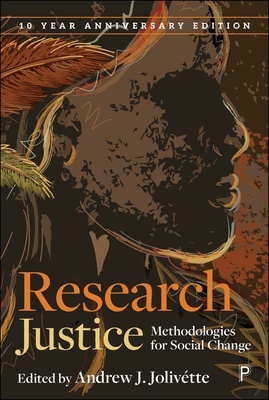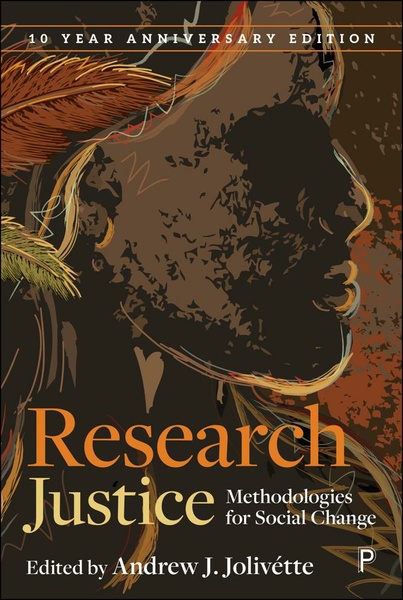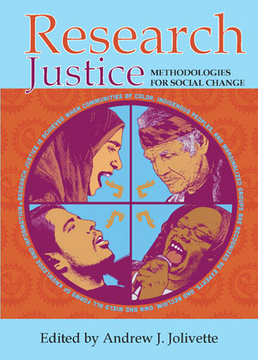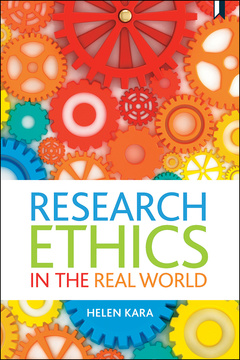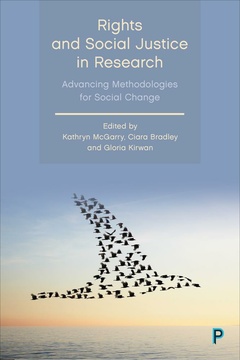Published
Apr 8, 2025Page count
272 pagesEdition
2nd EditionISBN
978-1447375593Dimensions
244 x 170 mmImprint
Policy PressPublished
Apr 8, 2025Page count
272 pagesEdition
2nd EditionISBN
978-1447375586Dimensions
244 x 170 mmImprint
Policy PressPublished
Apr 8, 2025Page count
272 pagesEdition
2nd EditionISBN
978-1447375609Dimensions
244 x 170 mmImprint
Policy PressPublished
Apr 8, 2025Page count
272 pagesEdition
2nd EditionISBN
978-1447375609Dimensions
244 x 170 mmImprint
Policy PressBuilding on the pioneering radical approach of the Research Justice: Methodologies for Social Change - a seminal text born out of the innovative work of the DataCenter Research for Justice - this updated edition explores the nexus of research, power and legitimacy, advocating for equitable knowledge construction.
Challenging traditional models, internationally recognised author Andrew Jolivette offers a much-needed analysis of the intersections between Research Methods, Public Policy, Cultural Studies, Anthropology and Sociology. Complete with a new introductory chapter, the book champions diverse forms of knowledge, envisioning a future where cultural, spiritual and experiential insights have equal impact on policymaking.
Interdisciplinary and thought-provoking, this is a vital resource for scholars and students alike.
"A sharp reminder of the absence of political discourse and of the values of social justice." - Journal of Social Policy
"Research Justice is a powerful book presenting alternative research approaches that actively incite social change at micro and macro levels." International Journal of Social Research Methodology
“I would recommend it to anyone studying research methods or ethics.” LSE Review of Books
“Exquisite, contemplative and urgent examination of the ways we can implement more equitable, community-oriented research methodologies that amplify the voices and experiences of the historically marginalized and disenfranchised.” Bonnie Duran, University of Washington
"As a long-time CBPR practitioner, I loved how Research Justice re-appropriates research as a space for love, reflexivity, cultural revitalization, community voice and power, and social transformation. Our imaginations are indeed inspired!" Nina Wallerstein, University of New Mexico
Andrew Jolivétte is Professor of Sociology and American Indian and Indigenous Studies at UC Santa Barbara.
Foreword - Angela Davis
Introduction - Andrew Jolivette
Part 1: Research Justice: Strategies for Knowledge Construction and Self-Determination
1. Research Justice: Radical Love as a Strategy for Social Transformation - Andrew Jolivette
2. Imagining Justice: Politics, Pedagogy, and Dissent - Antonia Darder
3. Blurred Lines: Creating and Crossing Boundaries between Interviewer and Subject - Amanda Freeman
4. Ethnography as a Research Justice Strategy - Liam Martin
5. Queered by the Archive: No More Potlucks and the Activist Potential of Archival Theory - Andrea Zeffiro and Mél Hogan
6. More Than Me - Nicole Blalock
Part 2: Research Justice: Strategies for Community Mobilization
7. The Socio-Psychological Stress of “Justice Denied”: Alan Crotzer's Story - Akeem T. Ray and Phyllis A. Gray
8. Formerly Incarcerated Women: Returning Home to Family and Community - Marta López-Garza
9. Disaster Justice: Mobilizing Grassroots Knowledge against Disaster Nationalism in Japan - Haruki Eda
10. A Health Justice Journey: Documenting Our Stories and Speaking for Ourselves - Alma Leyva, Imelda S. Plascencia and Mayra Yoana Jaimes Pena
11. By Us Not for Us: Black Women Researching Pregnancy and Childbirth - Julia Chinyere Oparah, Fatimah Salahuddin, Ronnesha Cato, Linda Jones, Talita Oseguera and Shanelle Matthews
12. Actos del Corazón: Las Sabias - Bridging the Digital Divide, and Redefining Historical Preservation - Cathryn Josefina Merla-Watson with the Corazones del Westside
Part 3: Research Justice: Strategies for Social Transformation and Policy Reform
13. Everyday Justice: Tactics for Navigating Micro, Macro and Structural Discriminations from the Intersection of Jim Crow and Hurricane Katrina - Sandra E. Weissinger
14. The Revolutionary, Non-Violent Action of Danilo Dolci and His Maieutic Approach - Domenica Maviglia
15. Telling to Reclaim, not to Sell: Resistance Narratives and the Marketing of Justice - Amrah J. Salómon
16. Decolonizing Knowledge: Toward a Critical Research Justice Praxis in the Urban Sphere - Michelle Fine
17. Decolonizing Knowledge: Toward a Critical Indigenous Research Justice Praxis - Linda Tuhiwai Smith








